- Jebel Ali Free Zone PO Box- 17483 Dubai, UAE
- +971 50 913 9812
- info@jisigus.com
igus® tribo-polymer research: friction, wear, mechatronics - tested in the igus® laboratory
Facts and figures of the igus® laboratories at a glance:
In the largest test laboratory in the industry igus® performs about 20% more tests with test setups for energy chains, flexible cables, plastic bearings as well as plain bearings, ball bearings and linear bearings, lead screw drives, bar stock, piston rings etc.
- 2,750 m2 Test lab
- 4,100 energy chain system tests annually at 180 testing stations: climate chamber, outdoor tests, sound chamber, travel up to 130 m, robot systems, etc.
- Two billion test cycles a year for flexible cables
- One million electrical measurements recorded annually
- 15,000 tribological tests (friction and wear) in 300 test set-ups
- 140 trillion test movements in the bearings business unit
Testlab bearings
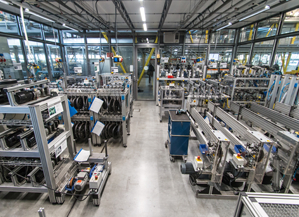
In the igus® test lab for iglidur® plain bearings, products are subjected to very different tests in order to test their quality and service life for various applications. For example, linear, pivoting and rotational wear as well as coefficient of friction are tested. Various parameters, such as temperature, load and surface speed, can be adapted individually depending on the test so that the plain bearing application can be simulated under various conditions.
Test lab for e-chains® and chainflex® cables.
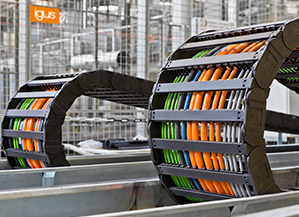
Through intensive research and testing, igus® is able to reduce costs while guaranteeing process reliability. Every year, 3,000 e-chains® tests are carried out on 180 rigs, so that the products can withstand the toughest conditions. igus® is constantly working on material improvements which ensure an even better harmonisation of the e-chain® and chainflex® cables.
For about twenty years, igus® has been conducting systematic chainflex® test series in its own test lab: At present, more than 800 tests are being carried out in parallel for flexible cables. In addition to the normal standards, tests and production standards have been created for chainflex® cables that meet the actual requirements for permanently moving applications.
igus® cold chamber
In the cold chamber, products are tested at temperatures down to -40°C to ensure the highest quality and durability at low ambient temperatures. Both e-chains® and chainflex® cables are tested here for their performance under extreme conditions, so that they can meet even the most demanding requirements.
Test lab for linear plain bearings, linear axes, lead screw modules
In the dry-tech® laboratory, not only iglidur® products, but also drylin® linear plain bearings, linear axes and lead screw modules are tested. The focus is on the examination of the tribological properties of different material pairings and the testing of assemblies. Testing individual custom applications is also possible here and can be carried out under different operating conditions in order to simulate the real application
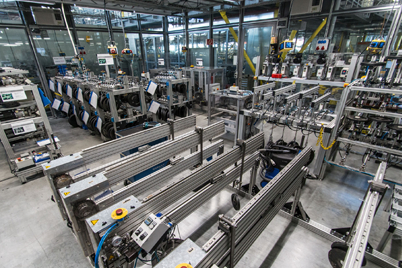
Testlabor Low Cost Robotics und Automation
With robolink®, it is possible to automate processes at low cost, easily and according to individual needs. The functioning, service life, robustness and failure scenarios of the individual components are tested in the robolink® test laboratory to ensure that the modular robotics system is also reliable and long-lasting.
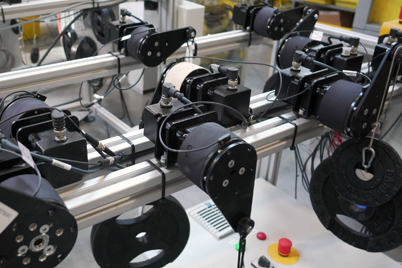
Cleanroom tests
igus® regularly meets the challenges of cleanroom technology for individual customer requirements with innovative products. The customer anticipates a continuous increase in quality particularly in this area. Thanks to extensive research and the resulting innovations, igus® is ideally equipped for these requirements.
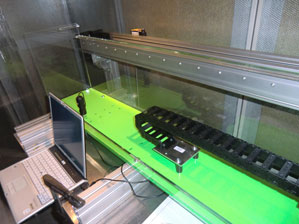
Noise tests
The noise level of igus® products is also tested. For example, for linear units, round shaft, miniature rail and profile rail guides. These are compared with a metal equivalent and their noise level is measured during movement. We are constantly developing our products to make them very quiet.
Outdoor tests
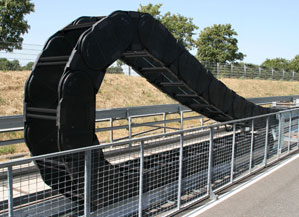
Even large e-chain® models can be tested at igus® under real application conditions. With the help of a special test set-up, the behaviour of the e-chain® is tested at long travels and measured with the aid of sensors. As a result, weak points can be detected and the service life as well as product design can be continuously improved.